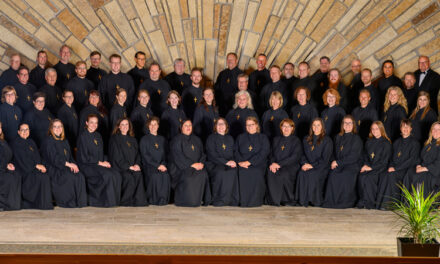He must have come home to North Carolina from the Pittsburgh Opera Center for Donizetti’s L’Elisir d’amore, which Capital Opera Raleigh is presenting in a couple of weeks, but that clearly wasn’t enough singing for tenor Jason Karn — or for his fans, many of whom turned out to hear and cheer him in a magnificent program given in Duke’s Nelson Music Room on September 9. Voice recitals seem endangered till you hear a few and realize that, while there aren’t as many of them as there used to be, they’ve lost little if any of their appeal, given the presence of a fine singer and outstanding support. Karn has a superb instrument. It’s flexible, even, and true. He stays on pitch, he doesn’t wallow around or carry on like some tenors of days gone by, and he can read and interpret dynamic markings pretty well. His voice is large, so it’s surely good for opera, in opera houses. It was at times a shade too big for Nelson, which is a lively space, but I suspect I am in the minority in carping that portions of his program, including roughly the first half of the opening cycle, were at times almost painfully loud. I’ll grant that some of the effect could have been imparted by the room, and from another part of the hall, the second half was altogether more impressive. This is not to say that Karn didn’t nail the music or that his interpretations were wanting in any significant way. It’s just that this is a powerful voice. He has the advantage of youth, and one suspects that moderation will gradually overtake him….
The evening began with Schumann’s great Dichterliebe, Op. 48, a set of 16 songs from Heinrich Heine’s 65-poem Lyrisches Intermezzo. This is a song cycle that doesn’t so much tell a story as hint at one. Typically of Schumann, the emotions and moods of the songs are all over the map, requiring keen attention to their diverse nuances. And coming close aboard Schumann’s previous outpouring of piano music, the songs not surprisingly have terrific parts for the keyboardist, who on this occasion was none other than the redoubtable David Heid, who can pour as much emotion into a little prelude or postlude as most orchestras manage in a whole night of noisy warhorses. With Heid at the piano and Karn illuminating the vocal lines, it was a treat to revisit this venerable set of songs, despite the fact that the first batch of ’em struck me as a bit over-sung.* There was however never any question about the visitor’s knowledge or understanding or, for that matter, his ability, and as the set unfolded he drew more and more listeners into that enchanting web that music weaves on very special occasions. By the end of Dichterliebe, he’d made true believers of nearly everyone present, to be sure. Concurrently, Heid reaffirmed that he’s one of the most supremely gifted pianists and accompanists working today, and not only in the Triangle.
The Schumann lasts only about half an hour, but it’s an intense period of time. There were texts and translations, and they were properly done to avoid page-turns in the middle of songs. There was a lot of intense listening and reading as the songs unfolded. There was applause after “Ich grolle nicht,” one of the more emphatic and dramatic songs, and then at the end, when there was a big outpouring of satisfaction from the audience.
A break was welcome before the program resumed — with George Butterworth’s A Shropshire Lad (1911), a setting of six poems by A.E. Housman. These are every bit as moving as Schumann’s songs, and they’re often as crushing, too. Butterworth was tortured by self-doubt as a composer, despite the good work he did early in his career. The songs sound like folksongs, which heavily influenced Butterworth, although they appear to be completely original. What makes them so profoundly moving to us now is our awareness of what happened to the composer just a few years after they were written. He wrote an orchestral rhapsody based on the opening song (“Loveliest of trees”) in 1912, and an idyll in 1913. At the outbreak of war he found the meaning and purpose music had failed to provide, and by the fall of 1915, as a member of the Duke of Cornwall’s Light Infantry, he was in the trenches. He was dead less than a year later, at the age of 31. It’s easy to hear the concluding song (“Is My Team Ploughing?”) as a look back from the grave.
Karn’s diction was immaculate, and he embodied these songs with impressive skill. Heid once more demonstrated full partnership. The overall impression was in many respects devastating, as it should have been.
Rodolfo’s aria, “Che gelida manina,” from Act I of La Bohème, showed in no uncertain terms that Karn has operatic chops, too. (He appeared in Opera Carolina’s Traviata earlier this year.) A meltingly beautiful performance of Tosti’s meltingly beautiful “L’alba separa dalla luce l’ombra”** was the concert’s sole encore. Many were reluctant to let this fine young artist go, but we can hear him again in Donizetti on 9/22 and 9/24. See our calendar for details.
*There are many fine recordings of Dichterliebe; a tenor version that best exemplifies restraint in this music was made by Aksel Schiøtz and Gerald Moore in 1945.
**People may not have thought they knew this song, but it has a long and celebrated history on records. Caruso made two takes of it, both published (although BMG reissued only one of them in its “complete” CD set). Many other famous tenors have recorded the song, too. Karn seemed to embody the best of these discs with none of their many excesses!











